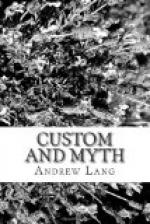When Sir Henry Maine observed, in 1861, that it was difficult to say what society of men had not been, originally, based on the patriarchal family, he went, of course, outside the domain of history. What occurred in the very origin of human society is a question perhaps quite inscrutable. Certainly, history cannot furnish the answer. Here the anthropologist and physiologist come in with their methods, and even those, we think, can throw but an uncertain light on the very ‘origin’ of institutions, and on strictly primitive man.
For the purposes of this discussion, we shall here re-state the chief points at issue between the adherents of Sir Henry Maine and of Mr. M’Lennan, between historical and anthropological inquirers.
1. Did man originally live in the patriarchal family, or did he live in more or less modified promiscuity, with uncertainty of blood-ties, and especially of male parentage?
2. Did circumstances and customs at some time compel or induce man (whatever his original condition) to resort to practices which made paternity uncertain, and so caused kinship to be reckoned through women?
3. Granting that some races have been thus reduced to matriarchal forms of the family—that is, to forms in which the woman is the permanent recognised centre—is there any reason to suppose that the stronger peoples, like the Aryans and the Semites, ever passed through a stage of culture in which female, not male, kinship was chiefly recognised, probably as a result of polyandry, of many husbands to one wife?
On this third question, it will be necessary to produce much evidence of very different sorts: evidence which, at best, can perhaps only warrant an inference, or presumption, in favour of one or the other opinion. For the moment, the impartial examination of testimony is more important and practicable than the establishment of any theory.
(1.) Did man originally live in the patriarchal family, the male being master of his female mate or mates, and of his children? On this first point Sir Henry Maine, in his new volume, {247a} may be said to come as near proving his case as the nature and matter of the question will permit. Bachofen, M’Lennan, and Morgan, all started from a hypothetical state of more or less modified sexual promiscuity. Bachofen’s evidence (which may be referred to later) was based on a great mass of legends, myths, and travellers’ tales, chiefly about early Aryan practices. He discovered Hetarismus, as he called it, or promiscuity, among Lydians, Etruscans, Persians, Thracians, Cyrenian nomads, Egyptians, Scythians, Troglodytes, Nasamones, and so forth. Mr. M’Lennan’s view is, perhaps, less absolutely stated than Sir Henry Maine supposes. M’Lennan says {247b} ’that there has been a stage in the development of the human races, when there was no such appropriation of women to particular men; when, in short, marriage, as it exists among civilised nations, was not practised. Marriage, in this sense, was yet undreamt of.’ Mr. M’Lennan adds (pp. 130, 131), ’as among other gregarious animals, the unions of the sexes were probably, in the earliest times, loose, transitory, and, in some degree, promiscuous.’




